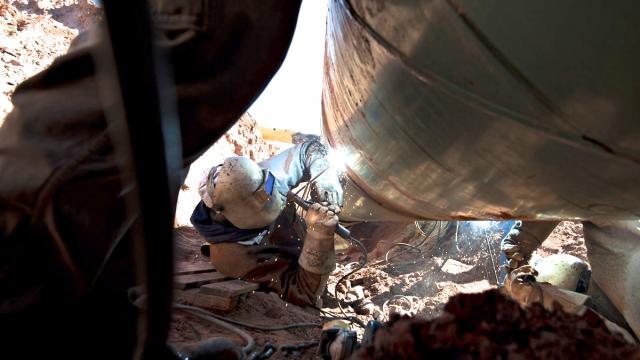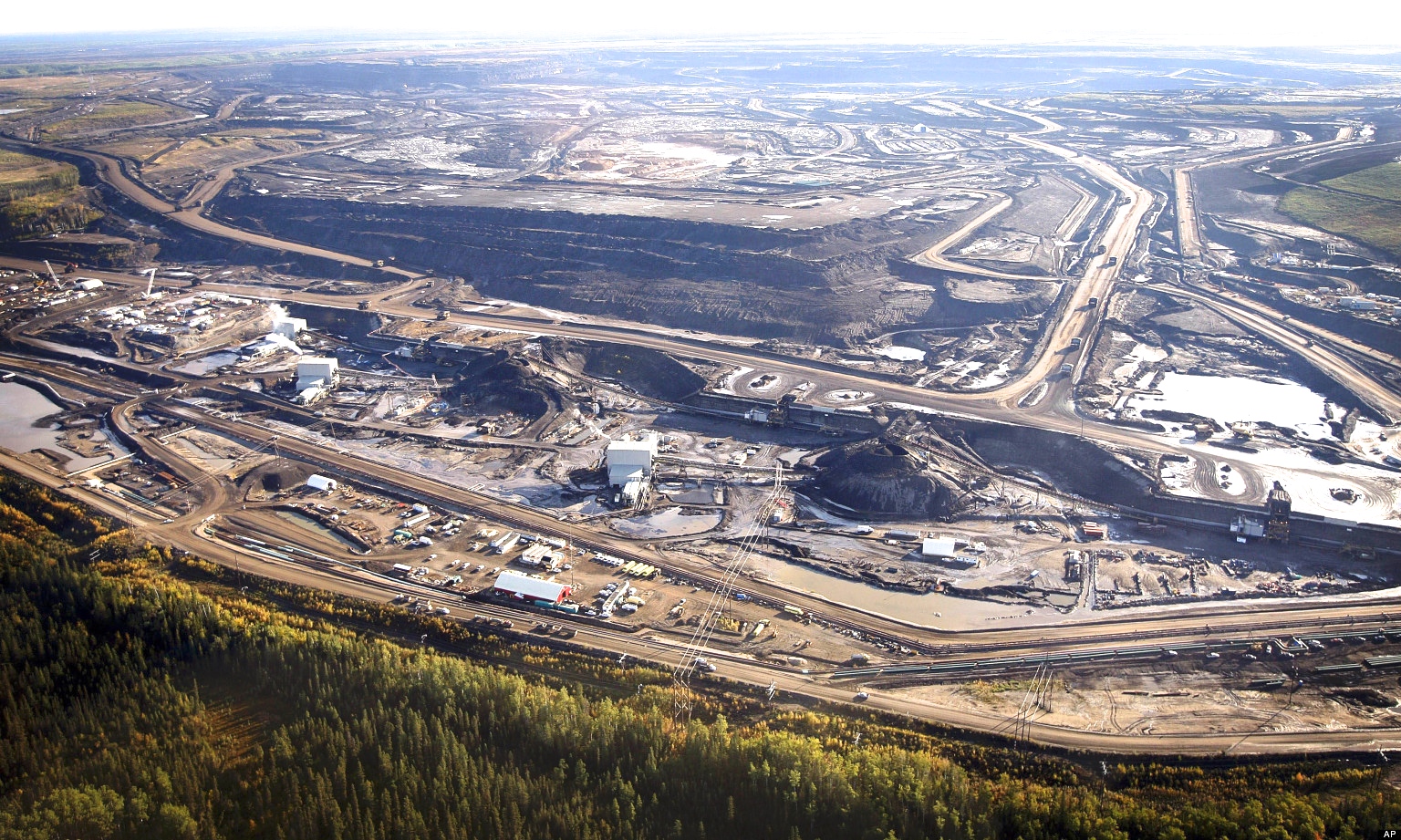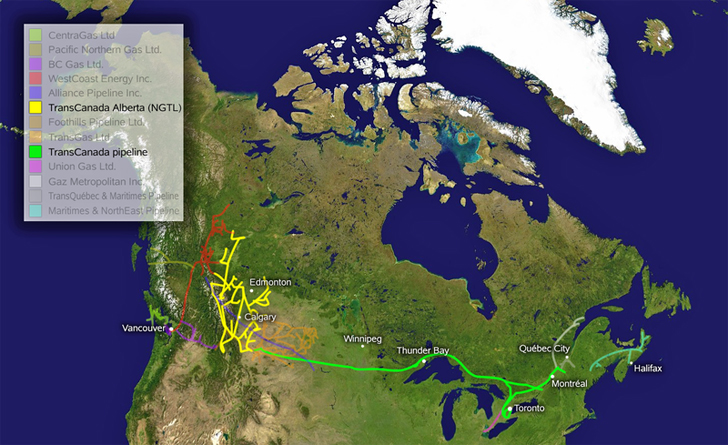
TransCanada’s Energy East pipeline was originally celebrated as the project that would connect the East and the West. Then, proponents said it was the project that would allow the Canadian petroleum industry to access new international markets. Next, it was known as the project that would provide oil for Eastern Canadians.
Amidst all the propaganda from the government, it is still another pipeline proposal to add to the mix of fossil fuel pipelines for which the industry is lobbying heavily. What sets it apart is how carefully TransCanada is navigating the political landscape and learning from the growing fights against other pipelines such as Northern Gateway and Line 9.
TransCanada’s Energy East Pipeline project would convert a partially used gas pipeline into a tar sands (likely diluted bitumen) pipeline. The existing pipeline runs from Alberta to Quebec and, if approved, the project would ultimately extend the pipe to Saint John, New Brunswick, crossing six provinces including some of the most populated regions in Canada and disrupting thousands of rivers, lakes and watersheds.
And get this: the pipe would carry 1.1 billion barrels of oil per day (bpd) — after originally planning to ship 850,000 bpd — through an old pipe built in the 1950s and originally intended for natural gas.
As pipeline fights in the west are sustaining momentum and delaying projects, fossil fuel companies are finding themselves landlocked and starving for new markets – which is precisely the motive driving TransCanada's Energy East project.
New Brunswick Premier David Alward has been celebrating the new oil jobs that would be created in Saint John, while visiting other provinces to talk about the "benefits" of the pipeline and to ensure that no province stands up to block either the company’s or New Brunswick’s plans.
Alberta is also doing its share of lobbying. Alberta Premier Alison Redford and International and Intergovernmental Trade Minister Cal Dallas recently went on a $120,000 “trade mission” and opened a provincial trade office in New Delhi to encourage India's welcoming of Canadian fossil fuels.
Resistance to Pipeline Expansion
Meanwhile, many who oppose Canada's pipeline expansions are seeing the limits of current forms of protest, such as in the conflict over the Keystone XL pipeline. The Tar Sands Blockade is an example of a sustained direct action campaign whose goal was to stop the southern portion of the Keystone XL from being built. For months, landowners and activists stood in front of machinery, set up tree sits on the pipeline route and chained themselves to pipeline equipment. In the end, activists faced a strategic lawsuit against public participation, or SLAPP, and that portion of the pipe was built.
But despite the setbacks, activists' work has expose the lengths to which TransCanada and other pipeline companies will go to profit at the expense of communities and the planet. They have expanded the possibilities of action people can take to stop large-scale energy extraction and infrastructure projects. By organizing with local landowners, the pipeline resistance movement has also exposed the injustice of eminent domain laws (also known as expropriation or compulsory acquisition).
Thus far, steady, incremental victories against the pipelines have barely been reported. If the stories are shared, it's not through mainstream news outlets but via alternative and social media. In addition to the Tar Sands Blockade’s success, there is also the example of the sustained blockade of the Pacific Trails Pipeline in northern British Columbia, where members of the Wet’suwet’en First Nation have set up log cabins, permaculture gardens and pit houses along the route of the pipeline. The direct action forced the company to reroute the project and caused its original environmental assessment to expire.
While some pipeline projects have been merely delayed through interference with construction, some of the delays may actually be a crucial step toward ultimately forcing the companies to abandon projects. The Pacific Trails Pipeline is a perfect example, where pipeline surveyors have been repeatedly sent off the land and given trespassing notices by local Indigenous peoples.
And in the case of the Energy East pipeline, though it may be difficult still to determine its technical viability, communities should rest assured that it is by no means a done deal. TransCanada hoped to file its application in 2013 and to be shipping tar sands through it by 2017. Last fall, however, the company announced it would wait until 2014 to submit its application.
Since Canada's conservative government has reduced the time allotted for environmental assessments, companies are diligently following the new reduced procedures. For Energy East, although the official proposal hasn’t been submitted, TransCanada and politicians are now laying the groundwork to make it through the two-year review process unscathed.
Thus, communities should behave accordingly: organizing teach-ins, canvassing their neighbors and building on the organizing efforts and stories of other pipeline resistors and those engaged in challenging expansions of the tar sands.
More specifically, delays in TransCanada’s application gives organizers extra time to educate and engage communities that would be directly impacted. The Council of Canadians has published a list of both Indigenous and settler communities located near the route, which would be impacted by a spill or fracture. TransCanada staff have visited numerous communities and organized open houses, but many residents argue it has been far from meaningful community engagement.
In North Bay, Ontario, locals attended TransCanada’s open houses dressed as TransCanada staff – but wearing polo shirts that said “SaveCanada.” They provided reading material to other residents who attended the open house, one of which said, “I read every one of TransCanada’s handouts and I didn’t learn a thing.”
According to the group, “SaveCanada is there to share your concerns. TransCanada is just sugarcoating the horrors.”
In Winnipeg, a number of teach-ins have been organized and local Idle No More organizers are highlighting the risks that the pipeline poses to Shoal Lake — the drinking water supply to Manitoba’s capital. When members of Shoal Lake First Nations attended TransCanada’s open houses, the company was unable to inform them how close the pipe would be to the Lake – even though the pipe was already built in the region.
Residents of Ontario and Quebec don't have to look very hard to see their region becoming a gateway for fossil fuel transport, both via pipelines such as Line 9 and via rail, as in Lac Megantic, Quebec, the site of a catastrophic train disaster last year.
As a result, residents are finding creative ways to build a groundswell and protect the region. Students at Laval University launched a Facebook petition to ban TransCanada from the campus farm, which is mainly used for research. The petition successfully made it to the school's administration, which denied access to TransCanada.
In the many movements against these projects, we must stay creative and innovative and seek avenues outside the formal review processes. In the case of TransCanada's Energy East, the pipeline has support from several provincial politicians, not to mention many in the country's oil-friendly conservative government.
Taking action through engagement with environmental assessments, alone, may be a difficult and deflating strategy. For such a long pipeline, which passes through so many communities, threatening so many waterways, don't underestimate the power of the people to find other ways to fight it.
3 WAYS TO SHOW YOUR SUPPORT
- Log in to post comments













